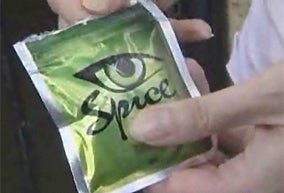'Natural high drug should be banned'

A "herbal high" that mimics the effect of cannabis should be banned, the Government's drug adviser said today.
The Advisory Council on the Misuse of Drugs said Spice could be more powerful than cannabis.
Pouches of the drug are widely available on the internet and in so-called "head shops" for around £20.
The council's chairman, Professor David Nutt, said although it was sold as a "natural" high, Spice was created using dangerous chemicals.
He said: "Spice and other synthetic cannabinoid products are being sold legally as harmless 'herbal legal highs'.
"However, the herbal content is coated in one or more dangerous chemical compounds that mimic the effects of cannabis.
"These are not harmless herbal alternatives and have been found to cause paranoia and panic attacks.
"That is why we are advising the Government to bring a large number of synthetic cannabinoids under the Misuse of Drugs Act."
Spice and other so-called "synthetic cannabinoids" escape existing drugs laws because they do not contain marijuana and are not chemically related to it.
But by spraying synthetic additives on to herbs, dealers can create similar intoxication in users to that caused by THC, the active ingredient in cannabis.
Analysis of samples of Spice show it has a "higher potency" than THC, the Advisory Council on the Misuse of Drugs (ACMD) warned.
It said Spice could be "more harmful" because of the quantity of chemicals in the drug is "unknown to the user".
Home Secretary Alan Johnson is expected to legislate later this year to ban Spice. It is likely to be made a class B drug, alongside cannabis.
A Home Office spokesman said: "We are determined to crack down on those so-called 'legal highs' that pose a significant health risk.
"To this end, earlier this year we asked the ACMD to look into the harms caused by so called 'legal highs' and recently received its advice on this group of man-made chemicals that act on the body in a similar way to cannabis.
"These have been recently found in herbal smoking products, including products sold under the brand name 'Spice'.
"We will publish our response shortly, along with the proposed controls for a range of other substances.
"We remain committed to tackling drug use in all its forms through tough enforcement, education and, where required, treatment. And it remains important that we continue to adapt our drug policy to tackle the changing environment in order to protect the public, especially our young people, from drug harms."
The review of legal highs was requested by former home secretary Jacqui Smith earlier this year and follows moves to ban Spice in Germany, Austria and France.
At around £20 for three grams of Spice - sold under brands such as Spice Silver, Spice Gold, Spice Diamond and Spice Yucatan Fire - prices are similar to cannabis.
The ACMD's report said herbs listed on the packets of the drug were often not found inside, but they did discover large amounts of Vitamin E used to hide other chemicals.
The council admitted there is little detailed information about the size of the Spice market but it is clearly "extensive" and distribution networks "well developed".
Reports from Germany suggested some users suffered heart problems after smoking the drug.
The ACMD's report stated: "Users cannot ... assume the same effects from the same product the next time they use it.
"Thus, there is potential for overdose should a person use a particularly strong batch or a synthetic cannabinoid with particularly high potency."
Join our commenting forum
Join thought-provoking conversations, follow other Independent readers and see their replies
Comments
Bookmark popover
Removed from bookmarks